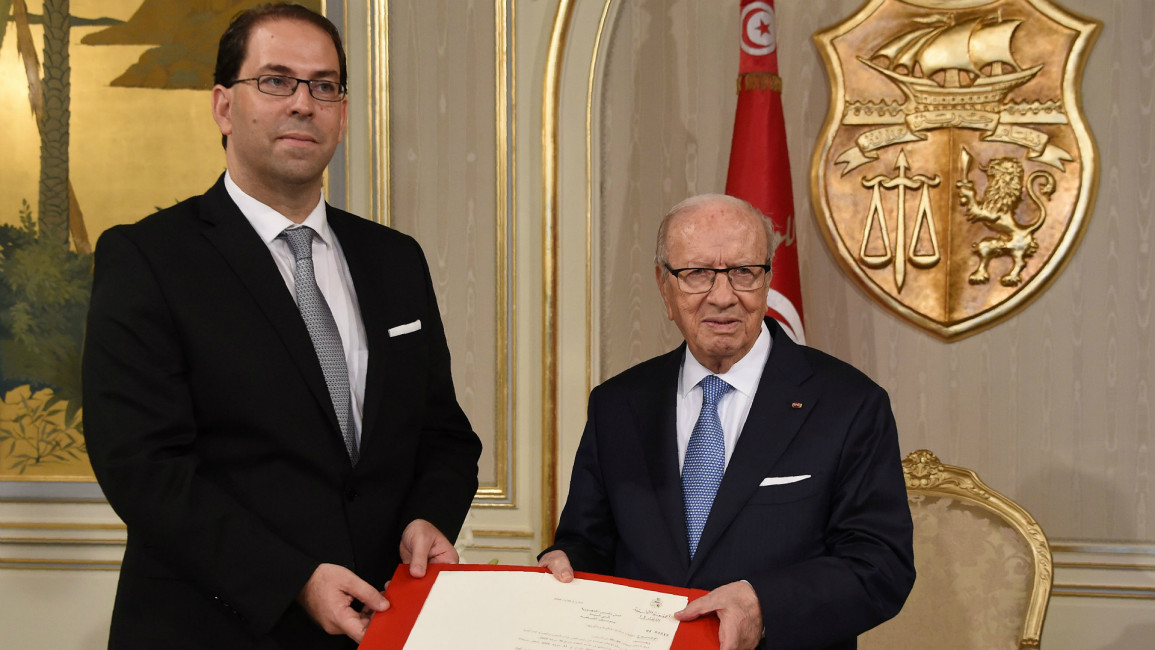Tunisia parliament approves new unity government
Tunisia parliament approves new unity government
Tunisian MPs have voted to give confidence to the government of Prime Minister Youssef Chahed, which includes Islamists and leftists, unionists and independents.
2 min read
Chahed was appointed by President Beji Caid Essebsi early this month [AFP]
Tunisia's parliament approved a new unity government proposed by Prime Minister-designate Youssef Chahed on Friday, aimed at tackling the country's growing socio-economic and security challenges.
The unity government, which includes Islamists and leftists, unionists and independents, was backed by 167 of the parliament's 217 members.
The vote in favour of the line-up makes Chahed – aged 40 – the country's youngest prime minister since independence from France in 1956.
But as Tunisia continues to find its bearings after the 2011 uprising that toppled longtime dictator Zine El Abidine Ben Ali, Chahed would also be the North African nation's sixth premier in less than six years.
Chahed was appointed by President Beji Caid Essebsi early this month after lawmakers passed a vote of no confidence in premier Habib Essid's government after just 18 months in office.
On Saturday, Chahed – a member of Essebsi's Nidaa Tounes party – said he would head a 27-member cabinet which will also include 14 ministers of state, eight women "in important" positions and "14 young" ministers.
The premier-designate said on Wednesday that the line-up would remain unchanged despite reservations among several allied parties.
The vote on the new cabinet on Friday comes after Tunisia in January witnessed its worst social unrest since the 2011 uprising that triggered similar revolts across the Arab world during the Arab Spring.
But as Tunisia continues to find its bearings after the 2011 uprising that toppled longtime dictator Zine El Abidine Ben Ali, Chahed would also be the North African nation's sixth premier in less than six years.
Chahed was appointed by President Beji Caid Essebsi early this month after lawmakers passed a vote of no confidence in premier Habib Essid's government after just 18 months in office.
On Saturday, Chahed – a member of Essebsi's Nidaa Tounes party – said he would head a 27-member cabinet which will also include 14 ministers of state, eight women "in important" positions and "14 young" ministers.
The premier-designate said on Wednesday that the line-up would remain unchanged despite reservations among several allied parties.
The vote on the new cabinet on Friday comes after Tunisia in January witnessed its worst social unrest since the 2011 uprising that triggered similar revolts across the Arab world during the Arab Spring.
While Tunisia is considered a rare success story of the Arab Spring, authorities have failed to resolve the issues of poverty, unemployment, regional disparities and corruption that preceded Ben Ali's fall.
Chahed will also have to address security in the country after a wave of militant attacks, including two that killed dozens of foreign tourists last year.
Agencies contributed to this report


![South Sudan famine [AFP] South Sudan famine [AFP]](/sites/default/files/styles/image_330x185/public/media/images/5FED4B35-6177-43AD-844A-5C63373FCF89.jpg?h=d1cb525d&itok=TC12KIPv)
